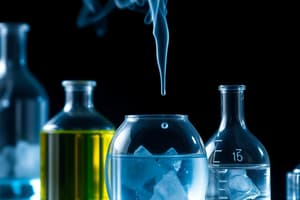Podcast
Questions and Answers
What is thermochemistry?
What is thermochemistry?
The study of energy changes that occur during chemical reactions and changes in state.
What is chemical potential energy?
What is chemical potential energy?
Energy stored in chemical bonds.
What is heat?
What is heat?
Energy that transfers from one object to another because of a temperature difference between the objects.
What is a system in thermochemistry?
What is a system in thermochemistry?
The law of conservation of energy states that energy is created or destroyed in a chemical process.
The law of conservation of energy states that energy is created or destroyed in a chemical process.
What is an endothermic process?
What is an endothermic process?
What is an exothermic process?
What is an exothermic process?
What is heat capacity?
What is heat capacity?
What is specific heat?
What is specific heat?
What is calorimetry?
What is calorimetry?
What is a calorimeter?
What is a calorimeter?
What is enthalpy (H)?
What is enthalpy (H)?
What is a thermochemical equation?
What is a thermochemical equation?
What is the heat of reaction?
What is the heat of reaction?
What is the heat of combustion?
What is the heat of combustion?
What is the molar heat of fusion (∆Hfus)?
What is the molar heat of fusion (∆Hfus)?
What is the molar heat of solidification (∆Hsolid)?
What is the molar heat of solidification (∆Hsolid)?
What is the molar heat of condensation (∆Hcond)?
What is the molar heat of condensation (∆Hcond)?
What is the molar heat of solution (∆Hsoln)?
What is the molar heat of solution (∆Hsoln)?
What does Hess's law of heat summation state?
What does Hess's law of heat summation state?
What is the standard heat of formation (ΔHf)?
What is the standard heat of formation (ΔHf)?
Flashcards are hidden until you start studying
Study Notes
Thermochemistry
- Studies energy changes during chemical reactions and state changes.
Chemical Potential Energy
- Energy is stored in the bonds of chemical compounds.
Heat
- Energy transferred between objects due to temperature differences.
System
- A defined part of the universe focused on during analysis; can vary in size.
Law of Conservation of Energy
- Energy cannot be created or destroyed in chemical or physical processes.
Endothermic Process
- Absorbs heat from surroundings leading to a temperature drop in the environment.
Exothermic Process
- Releases heat into the surroundings, increasing external temperature.
Heat Capacity
- The amount of heat needed to increase an object's temperature by 1ºC.
Specific Heat
- The heat required to raise the temperature of 1 gram of a substance by 1ºC.
Calorimetry
- Technique for measuring heat flow into or out of a system during chemical and physical changes.
Calorimeter
- Insulated device designed to measure heat absorption or release.
Enthalpy (H)
- Represents the heat content of a system at constant pressure.
Thermochemical Equation
- A chemical equation that incorporates the enthalpy change associated with the reaction.
Heat of Reaction
- Enthalpy change for a specific chemical equation as written.
Heat of Combustion
- The enthalpy change associated with the complete burning of one mole of a substance.
Molar Heat of Fusion (∆Hfus)
- Heat absorbed to convert one mole of a solid into a liquid at a constant temperature.
Molar Heat of Solidification (∆Hsolid)
- Heat released when one mole of a liquid solidifies at a constant temperature.
Molar Heat of Condensation (∆Hcond)
- Heat released by one mole of vapor when it condenses into a liquid at constant temperature.
Molar Heat of Solution (∆Hsoln)
- Enthalpy change occurring during the dissolution of one mole of a substance.
Hess's Law of Heat Summation
- States that the total heat of reaction can be found by adding heats of individual reactions.
Standard Heat of Formation (ΔHf)
- Enthalpy change when forming one mole of a compound from its elements, measured under standard conditions (25°C).
Studying That Suits You
Use AI to generate personalized quizzes and flashcards to suit your learning preferences.




